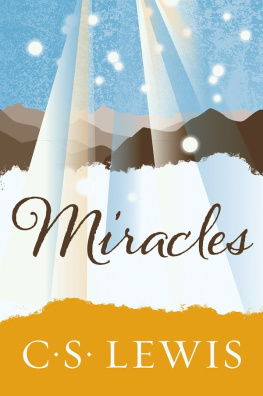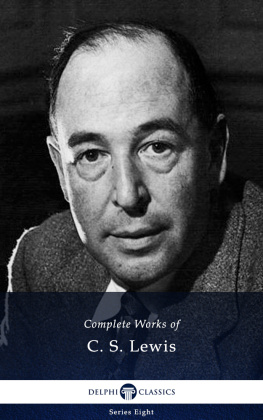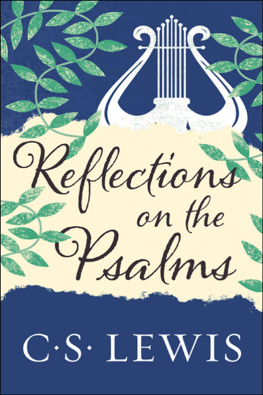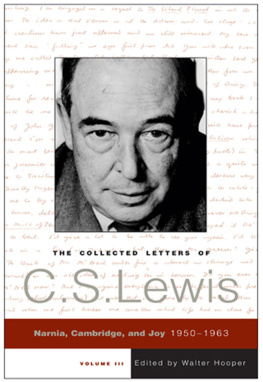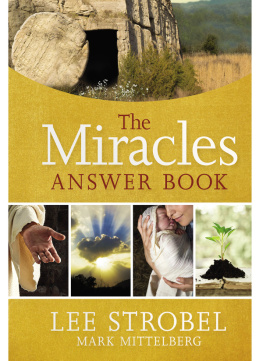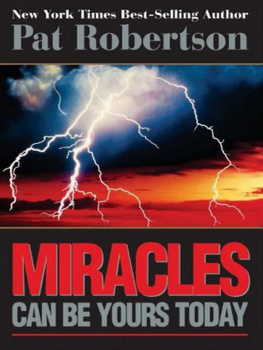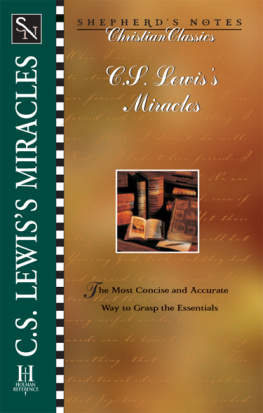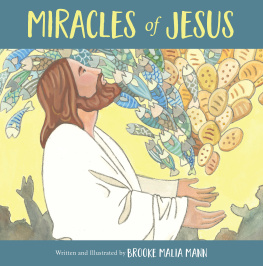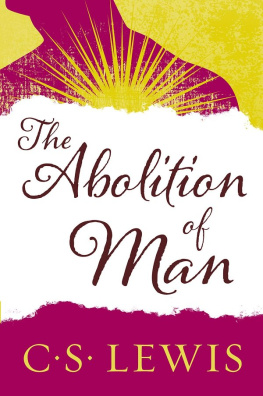C. S. Lewis - Miracles
Here you can read online C. S. Lewis - Miracles full text of the book (entire story) in english for free. Download pdf and epub, get meaning, cover and reviews about this ebook. year: 2009, publisher: Harper Collins, genre: Religion. Description of the work, (preface) as well as reviews are available. Best literature library LitArk.com created for fans of good reading and offers a wide selection of genres:
Romance novel
Science fiction
Adventure
Detective
Science
History
Home and family
Prose
Art
Politics
Computer
Non-fiction
Religion
Business
Children
Humor
Choose a favorite category and find really read worthwhile books. Enjoy immersion in the world of imagination, feel the emotions of the characters or learn something new for yourself, make an fascinating discovery.
Miracles: summary, description and annotation
We offer to read an annotation, description, summary or preface (depends on what the author of the book "Miracles" wrote himself). If you haven't found the necessary information about the book — write in the comments, we will try to find it.
Miracles — read online for free the complete book (whole text) full work
Below is the text of the book, divided by pages. System saving the place of the last page read, allows you to conveniently read the book "Miracles" online for free, without having to search again every time where you left off. Put a bookmark, and you can go to the page where you finished reading at any time.
Font size:
Interval:
Bookmark:
A Preliminary Study

To
Cecil and Daphne Harwood
Among the hills a meteorite
Lies huge; and moss has overgrown,
And wind and rain with touches light
Made soft, the contours of the stone.
Thus easily can Earth digest
A cinder of sidereal fire,
And make her translunary guest
The native of an English shire.
Nor is it strange these wanderers
Find in her lap their fitting place,
For every particle thats hers
Came at the first from outer space.
All that is Earth has once been sky;
Down from the sun of old she came,
Or from some star that travelled by
Too close to his entangling flame.
Hence, if belated drops yet fall
From heaven, on these her plastic power
Still works as once it worked on all
The glad rush of the golden shower.
C.S.L.
Reprinted by permission of Time and Tide
The Scope of This Book
The Naturalist and the Supernaturalist
The Cardinal Difficulty of Naturalism
Nature and Supernature
A Further Difficulty in Naturalism
Answers to Misgivings
A Chapter of Red Herrings
Miracles and the Laws of Nature
A Chapter not Strictly Necessary
Horrid Red Things
Christianity and Religion
The Propriety of Miracles
On Probability
The Grand Miracle
Miracles of the Old Creation
Miracles of the New Creation
Epilogue
On the Words Spirit and Spiritual
On Special Providences
Those who wish to succeed must ask the right preliminary questions.
ARISTOTLE , Metaphysics, II, (III), i.
In all my life I have met only one person who claims to have seen a ghost. And the interesting thing about the story is that that person disbelieved in the immortal soul before she saw the ghost and still disbelieves after seeing it. She says that what she saw must have been an illusion or a trick of the nerves. And obviously she may be right. Seeing is not believing.
For this reason, the question whether miracles occur can never be answered simply by experience. Every event which might claim to be a miracle is, in the last resort, something presented to our senses, something seen, heard, touched, smelled, or tasted. And our senses are not infallible. If anything extraordinary seems to have happened, we can always say that we have been the victims of an illusion. If we hold a philosophy which excludes the supernatural, this is what we always shall say. What we learn from experience depends on the kind of philosophy we bring to experience. It is therefore useless to appeal to experience before we have settled, as well as we can, the philosophical question.
If immediate experience cannot prove or disprove the miraculous, still less can history do so. Many people think one can decide whether a miracle occurred in the past by examining the evidence according to the ordinary rules of historical inquiry. But the ordinary rules cannot be worked until we have decided whether miracles are possible, and if so, how probable they are. For if they are impossible, then no amount of historical evidence will convince us. If they are possible but immensely improbable, then only mathematically demonstrative evidence will convince us: and since history never provides that degree of evidence for any event, history can never convince us that a miracle occurred. If, on the other hand, miracles are not intrinsically improbable, then the existing evidence will be sufficient to convince us that quite a number of miracles have occurred. The result of our historical enquiries thus depends on the philosophical views which we have been holding before we even began to look at the evidence. This philosophical question must therefore come first.
Here is an example of the sort of thing that happens if we omit the preliminary philosophical task, and rush on to the historical. In a popular commentary on the Bible you will find a discussion of the date at which the Fourth Gospel was written. The author says it must have been written after the execution of St Peter, because, in the Fourth Gospel, Christ is represented as predicting the execution of St Peter. A book, thinks the author, cannot be written before events which it refers to. Of course it cannotunless real predictions ever occur. If they do, then this argument for the date is in ruins. And the author has not discussed at all whether real predictions are possible. He takes it for granted (perhaps unconsciously) that they are not. Perhaps he is right: but if he is, he has not discovered this principle by historical inquiry. He has brought his disbelief in predictions to his historical work, so to speak, ready made. Unless he had done so his historical conclusion about the date of the Fourth Gospel could not have been reached at all. His work is therefore quite useless to a person who wants to know whether predictions occur. The author gets to work only after he has already answered that question in the negative, and on grounds which he never communicates to us.
This book is intended as a preliminary to historical inquiry. I am not a trained historian and I shall not examine the historical evidence for the Christian miracles. My effort is to put my readers in a position to do so. It is no use going to the texts until we have some idea about the possibility or probability of the miraculous. Those who assume that miracles cannot happen are merely wasting their time by looking into the texts: we know in advance what results they will find for they have begun by begging the question.
Gracious! exclaimed Mrs Snip, and is there a place where people venture to live above ground?
I never heard of people living under ground, replied Tim, before I came to Giant-Land. Came to Giant-Land! cried Mrs Snip, why, isnt everywhere Giant-Land?
ROLAND QUIZZ , Giant-Land, chap xxxii.
I use the word Miracle to mean an interference or the Supernaturalists are right. And here comes our first difficulty.
Before the Naturalist and the Supernaturalist can begin to discuss their difference of opinion, they must surely have an agreed definition both of Nature and of Supernature. But unfortunately it is almost impossible to get such a definition. Just because the Naturalist thinks that nothing but Nature exists, the word Nature means to him merely everything or the whole show or whatever there is. And if that is what we mean by Nature, then of course nothing else exists. The real question between him and the Supernaturalist has evaded us. Some philosophers have defined Nature as What we perceive with our five senses. But this also is unsatisfactory; for we do not perceive our own emotions in that way, and yet they are presumably natural events. In order to avoid this deadlock and to discover what the Naturalist and the Supernaturalist are really differing about, we must approach our problem in a more roundabout way.
I begin by considering the following sentences (I) Are those his natural teeth or a set? (2) The dog in his natural state is covered with fleas. (3) I love to get away from tilled lands and metalled roads and be alone with Nature. (4) Do be natural. Why are you so affected? (5) It may have been wrong to kiss her but it was very natural.
A common thread of meaning in all these usages can easily be discovered. The natural teeth are those which grow in the mouth; we do not have to design them, make them, or fit them. The dogs natural state is the one he will be in if no one takes soap and water and prevents it. The countryside where Nature reigns supreme is the one where soil, weather and vegetation produce their results unhelped and unimpeded by man. Natural behaviour is the behaviour which people would exhibit if they were not at pains to alter it. The natural kiss is the kiss which will be given if moral or prudential considerations do not intervene. In all the examples Nature means what happens of itself or of its own accord: what you do not need to labour for; what you will get if you take no measures to stop it. The Greek word for Nature (Physis) is connected with the Greek verb for to grow; Latin Natura , with the verb to be born. The Natural is what springs up, or comes forth, or arrives, or goes on, of its own accord: the given, what is there already: the spontaneous, the unintended, the unsolicited.
Font size:
Interval:
Bookmark:
Similar books «Miracles»
Look at similar books to Miracles. We have selected literature similar in name and meaning in the hope of providing readers with more options to find new, interesting, not yet read works.
Discussion, reviews of the book Miracles and just readers' own opinions. Leave your comments, write what you think about the work, its meaning or the main characters. Specify what exactly you liked and what you didn't like, and why you think so.

